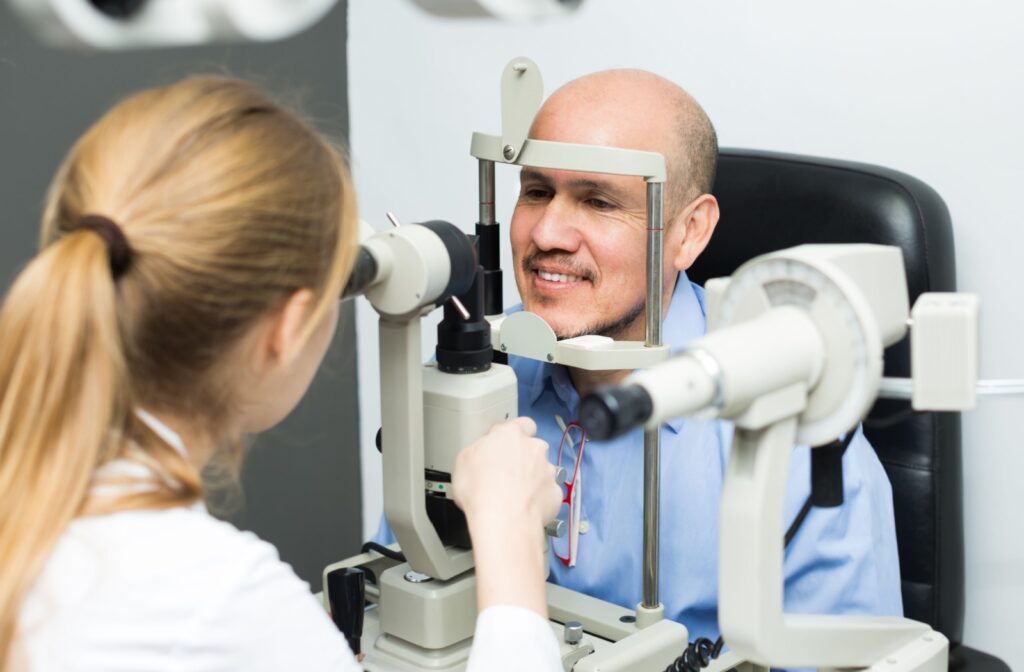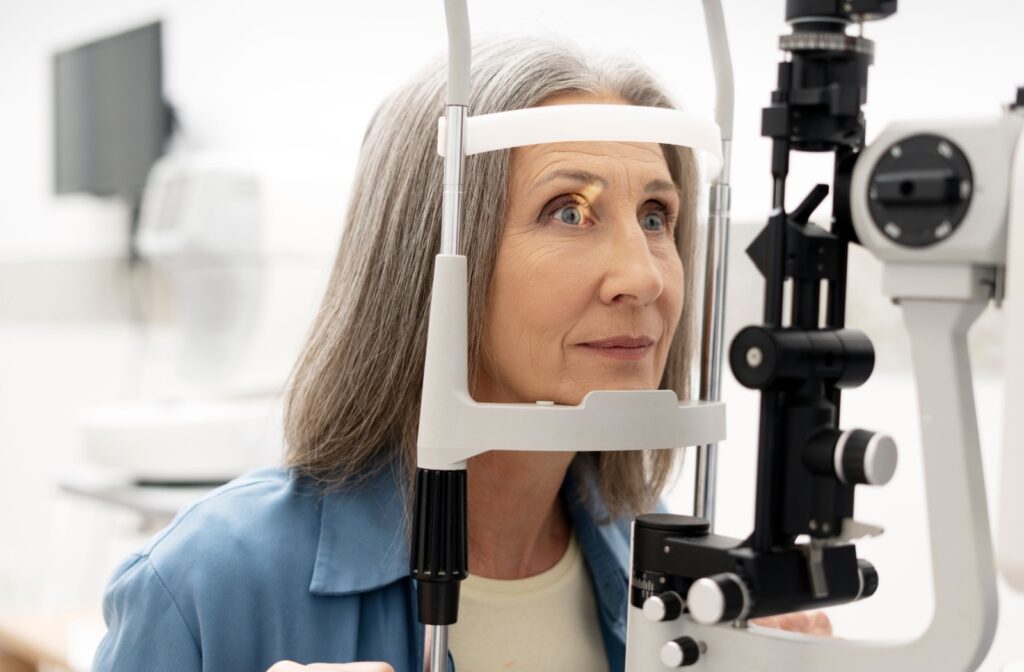An eye exam checks more than just your vision. It also gives us a chance to look for signs of underlying health conditions. Eye exams vary in length depending on your needs, so knowing what to expect can help you feel more prepared and help you make the most of your time.
Here’s a breakdown of how long different types of eye exams typically take:
- Routine Eye Exam: Approximately 30 minutes
- Contact Lens Exam: 45 to 60 minutes
- Diabetic Eye Exam: Around 60 minutes
- Additional Testing: 20 to 60 minutes
A small investment of time can have a big impact on your long-term vision.
Types of Eye Exams & What to Expect
Every eye exam has its own purpose. Some are based on age, others on specific vision needs or health conditions. Regardless of why you’re booking, comprehensive exams help detect early signs of eye disease, support healthy vision, and keep your prescription up to date.
Children’s Eye Exams
Children rely heavily on vision for learning and development. Annual exams help monitor healthy eye development and can catch issues like amblyopia or refractive errors early. These exams typically take around 30 minutes, depending on age, health, and cooperation.
During a child’s exam, we assess factors like visual acuity, eye alignment, and focusing ability. Eye exams are especially important if a child is too young to describe symptoms or read an eye chart on their own. If problems are detected, the appropriate testing and follow ups can be made.
Vision challenges caught early are often easier to manage and correct.
Adult Eye Exams
For adults aged 18–64, we recommend an eye exam every two years. Most adult exams last about 30 minutes, though the total time may vary based on your needs and symptoms.
Beyond checking your vision prescription, we assess your overall eye health, visual function, and risk of conditions like glaucoma or high blood pressure. These routine checkups play a key role in protecting vision long-term, especially if you spend a lot of time on screens or in demanding visual environments.
Senior Eye Exams

After age 65, yearly eye exams are important for identifying age-related changes such as cataracts, macular degeneration, or glaucoma. These exams may take a bit longer depending on what’s being assessed, especially if additional tests are needed.
For older adults, maintaining vision health is vital to supporting independence and daily quality of life. Exams can help catch changes early before they interfere with daily activities like reading, driving, or managing medication.
Contact Lens Exams
If you wear contact lenses or are trying them for the first time, you’ll need a contact lens exam. This includes a regular eye exam plus a lens fitting and possibly some training for new contact lens wearers. Plan for around 45 to 60 minutes, which we typically break up into two appointments. Multifocal, monovision, or toric contact lens fittings may require even more time, depending on the patient, their visual goals, and how well the eyes/brain adapt.
Because contacts sit directly on the surface of your eye, fit and prescription accuracy are especially important. We may use corneal measurements and tear film assessments to guide your lens selection.
Ongoing monitoring helps your eyes stay healthy and comfortable. A thorough ocular health assessment is done for every patient to ensure adequate corneal health for contact lens wear. This is especially important for current contact lens wearers, who are at high risk of eye diseases related to contact lens wear. If complications have occurred, treatment or referral can be initiated right away.
Diabetic Eye Exams
Diabetes can affect the delicate blood vessels in your eyes and cause potentially irreversible problems with your vision. A diabetic eye exam can include pupil dilation (which takes about 20 minutes) and imaging like fundus photography, widefield retinal imaging, and OCT scans. Diabetes can also affect the cornea, lens, and many other areas of the eye.
Additionally, diabetes can cause changes in your glasses prescription, usually through causing certain parts of the eye to swell. A thorough slit lamp exam and refraction are performed during these exams. These exams usually last about an hour, although follow ups may be offered depending on which types of diabetic changes are occurring in the eye
Even if you’re not experiencing vision changes, diabetic eye exams are essential for early detection of conditions like diabetic retinopathy or macular edema—conditions that can develop silently and progress quickly without symptoms. Regular exams are a key part of diabetes management. Diabetic eye exams are recommended annually, or more depending on the condition.
When Extra Testing Is Needed
Sometimes, a routine eye exam reveals something that needs a closer look. Additional tests may include:
- Visual field tests to check your side or peripheral vision.
- OCT imaging scans for detailed images of your retina and optic nerve.
- Dilated fundus exams to examine the front and back of your eye more closely.
The total time for your visit can vary depending on the clinic, the type of exam, and whether additional testing is needed. These add-ons can take 20 minutes to over an hour, but they offer important insights that support your long-term eye health.
Lake Country Optometry patients benefit from a streamlined experience that blends efficiency with comprehensive care. Diagnostic technology is built into each exam, allowing us to assess, inform, and recommend next steps. This means fewer return trips and more immediate answers.
Keep Your Eyes Healthy
Understanding how long an eye exam takes can help you plan ahead and feel more confident about your care. Lake Country Optometry provides routine vision checks as well as more complex testing in order to support your long-term eye health and peace of mind.
We’re committed to providing efficient, personalized exams that fit your needs and your schedule. Whether you’re coming in for a quick prescription check or more in-depth care, our team is here to provide efficient, thorough care for your specific eye care needs.
Book your eye exam today and see the difference personalized care can make.




